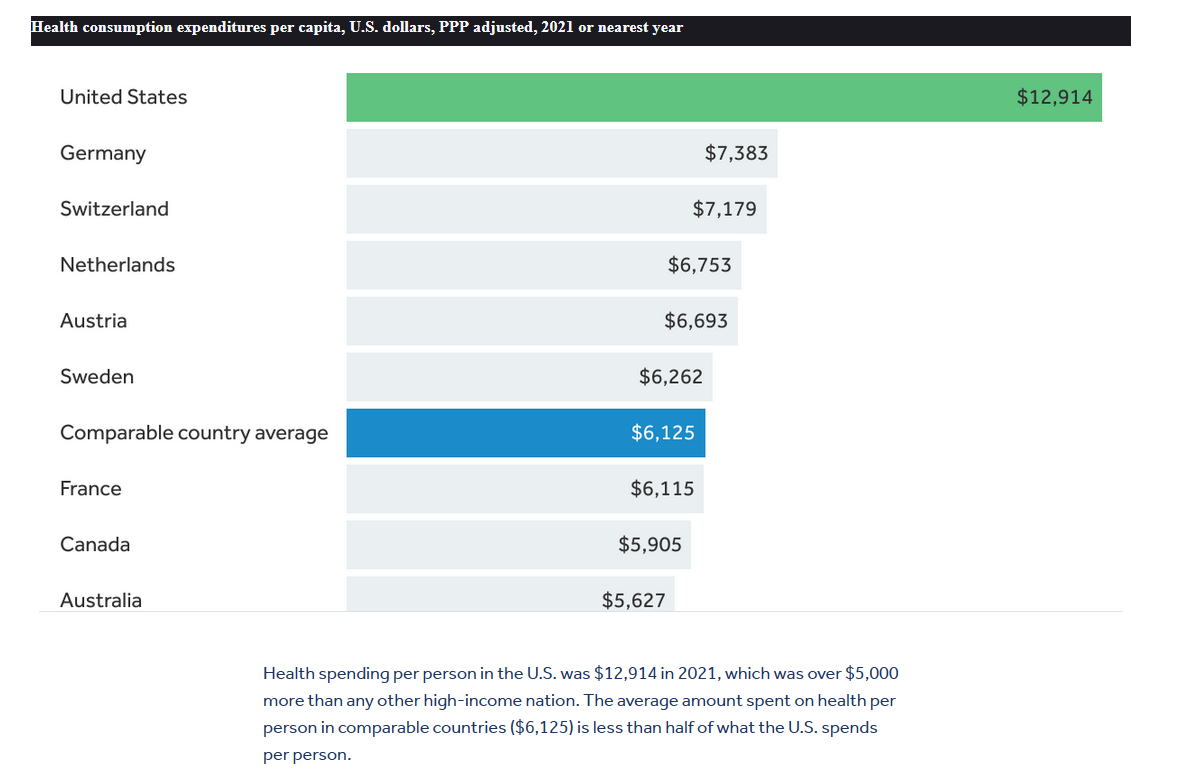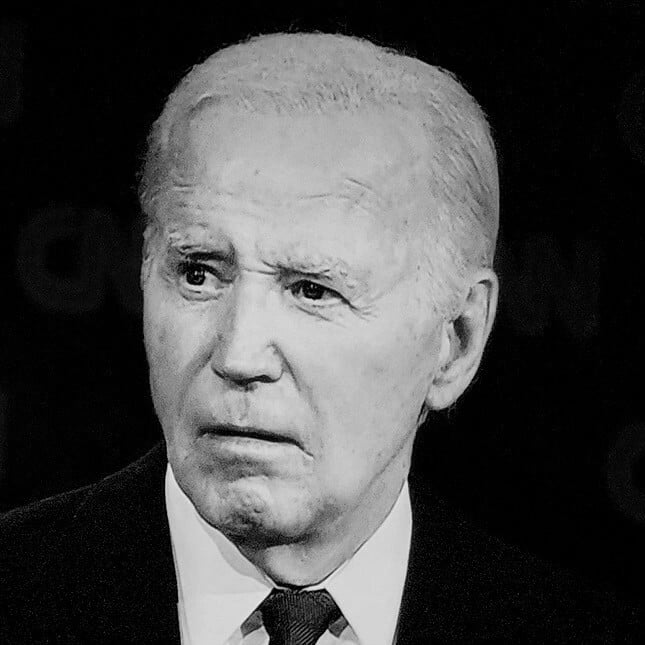American taxpayers footed the bill for at least $1.8 trillion in federal and state health care expenditures in 2022 — about 41% of the nearly $4.5 trillion in both public and private health care spending the U.S. recorded last year, according to the annual report released last week by the Centers for Medicare and Medicaid Services.
On top of that $1.8 trillion, third-party programs, which are often government-funded, and public health programs accounted for another $600 billion in spending.
This means the U.S. government spent more on health care last year than the governments of Germany, the U.K., Italy, Spain, Austria, and France combined spent to provide universal health care coverage to the whole of their population (335 million in total), which is comparable in size to the U.S. population of 331 million.
Between direct public spending and compulsory, tax-driven insurance programs, Germany spent about $380 billion in health care in 2022; France spent around $300 billion, and so did the U.K.; Italy, $147 billion; Spain, $105 billion; and Austria, $43 billion. The total, $1.2 trillion, is about two-thirds of what the U.S. government spent without offering all of its citizens the option of forgoing private insurance.
I feel vindicated. Not 15 days ago I complained about paying more in taxes AND health insurance. And I’ve been saying it for over a decade. Fuck private healthcare, it serves no purpose for the people.
Yep, this is why I argue with people who say, we should raise taxes to fund it…no fuck that, we can afford it now already without having to raise taxes even a penny.
We would save a significant amount of money. And private insurance almost always doesn’t provide good healthcare. Imagine no copays or deductables.
Imagine not having to argue with a massive corporation about whether you should be able to take the medication your doctor told you to take.
Imagine not having to choose between taking your kid to the doctor for $300 and a sick note for sniffles or letting him tough it out and get marked truant.
I have to say, being on Medicaid through college showed just how true this is. Being able to put my health first, rather than worry about if I could afford a doctor visit (or an ER visit), was great. The peace of mind of knowing that I would pay $0 for ANYTHING medical lead to me putting my health first.
The one potential charge you could get was for going to the ER for something deemed a “non-emergency.” Even then I didn’t worry about whether I could go to the ER after whiffing it off my longboard and smacking my head into the pavement because… well, the non-emergency charge was $8.
This was very eye-opening for me as an American into the world of public healthcare.
Yeah that’s pretty informative. I am not sure how well the recommendation for implementing it in the US would work though. It’s probably the best chance anyone in the US has for government funded healthcare, but it would mean people in the poorest states would get the worst healthcare. It would probably still be a step up and we could give solutions to that problem later.
This may not be a popular question, but: Would Americans be willing to pay less?
No really. This would mean a lot of good jobs being cut. Yes, they are jobs that provide no benefit to the public (rather the opposite), but thinking about the big picture isn’t very American. Americans like to side with the little guy.
It gets worse. It would mean a huge pay cut for doctors. They are way overpaid compared to doctors anywhere else. Would Americans side with
themselvesthe peoplethe government or those nice family doctors?BUT, small businesses would benefit, and entrepreneurs, if they didn’t have to worry about health insurance. Doctors offices costs would come down without a lot of complicated billing stuff to do. Billing specialists would lose their jobs. Of my circle of people - husband would lose his job unless it was a Germany style system, and two other people I know.
If you want some sort of employment program, the medical system here is a shit way to go about it. Why not pay people to do something with a good impact on the land or the people?
And again - universal, tax-paid coverage would favor small business, it’s easier to take a risk when it doesn’t mean you might go bankrupt from a medical issue.
small businesses would benefit, and entrepreneurs,
Quite possible. Rates of self-employment are higher in France and Germany (2022 OECD stats). I’m not sure if that figure should be taken at face value, though.
unless it was a Germany style system
You mean a system with mandatory insurance? Administrative costs are substantially higher in US health care. Anything to bring quality and costs more in line with peer countries would mean a substantial hit, regardless of the system adopted.
Why not pay people to do something with a good impact on the land or the people?
Good question. Just a cursory glance into the statistics will tell anyone that the US system is dysfunctional. It’s been that way for decades or longer. I don’t even know when it became obvious that it wasn’t doing as well as its peers. And yet, there hasn’t been a lot of effort to improve it (Kudos to Obama, though). Maybe Americans just don’t want to do what it takes. Maybe they just want a better outcome, without all the small, necessary steps to get there.
On Unless it was a Germany style system (sorry I don’t know how to do the inline quotes yet)
I mean that Germany uses highly regulated private insurance plans to get to universal coverage. That would probably be an easier sell here, than a one plan to rule them all NHS. Not saying it’s a better idea. I have argued for YEARS that single payer would be a good idea here because we already have Medicare, just expand it to everyone and audit the fuck out of the providers would be cheapest and most efficient.
I don’t know how to do inline quotes yet
Use the “greater than” symbol: “> teehee I’m a quote”
Use the “greater than” symbol: “> teehee I’m a quote”
Thanks!
First of all what? Typically the highest paid members of hospital staff of “Administrators” who have completely shifted health care into a for-profit business. If the government regulated them out of their jobs and there were price caps set in place instead of wasting hundreds of hours decoding billing and fighting insurance companies doctors would very likely make more. They would also be more likely to actually try to help you versus hit unrealistic patient exam quotas to try and extract as much money from insurance to benefit the administration staff. Hell new doctors in medical school are pretty much unpaid and forced to work hours that somehow circumvent labor laws. The whole medical industry needs to be overhauled. Getting rid of middle management would free up capital that could be properly reinvested into the hospital for better equipment, wages etc.
doctors would very likely make more
I expect that’s politically the way to go; not that I know anything about that. You get rid of a few inefficiencies and pay off other stakeholders with most of the gains.
The fact remains, if you want to lower health care costs to levels comparable to other countries, you have to lower all the costs to comparable levels, including doctor’s pay.
I don’t think you understand just how much bloated administrative costs and bureaucracy account for the U.S.‘s healthcare spending. It’s absolutely NOT doctors’ salaries accounting for the literally billions we are spending and no doctor’s shouldn’t be paid less to do the same job. Remove the middle men and ghoulish profiteering from healthcare.
The US can pay doctors as much as it wants. If Americans think that doctors deserve more than they get in other countries, that’s not for me to judge. Mind, that it does imply that the US is more unequal than other countries, because Americans want it to be.
True, merely lowering the administrative overhead will also go some ways to lower costs. But here, too, I wonder if Americans are really willing to do that. Sure, everyone wants to get rid of the useless middle men, but that’s not anyone’s job description.
Education costs in the US are also astronomically higher than other countries, which when you’re indebted 250-500k as soon as you graduate medical school, you are going to command a higher wage to make payments. The Education system in the US suffers from the same “we should run this like a business” greed that the medical industry does and should absolutely be reformed. Cause freedom isn’t free but it can be financed 🙄
Are you calling for profit insurance the little guy? I don’t know why people think doctors would be the ones taking the hit and not the for profit corporations.
No. I am asking if Americans would actually be willing to see cuts happen.
To answer your implied question: Because corporations don’t consume. They don’t go on holidays, live in mansions, … There is nothing there which can take the hit.
Corporations do consume, go on holiday, live in mansions… The executives wouldn’t lower their standards or travel on their own dime.
If you think for profit corporations don’t have excess then you must not live in the same reality.
Executives are employees, not corporations.
Corporations give things to their executives. Company retreats? Company jets? Company cars? Do none of these exist in your reality?
This would mean a lot of good jobs being cut
Oh, no! We eliminated useless positions that accomplish nothing but sucking the life out of the system. However will we go on?
Americans like to side with the little guy
As you americans tell it: That’s bullsh*t. I see you guys getting fucked everyday by corporate. It’s hard to believe this is the U.S that holds international power… it looks like a Circus on fire looking inside from the outside.
As somebody trapped in this circus, lemme tell you, I want the fuck out of this clown car.

Private health care is literal vampirism.
Benefiting from the ill health and suffering of others? Yeah that sounds right
Year over year my insurance at huge companies would get both worse and costlier. It was to the point that the insurance that was costing me $200/mo was literally just acting as a safeguard against something costing me $10,000- which would have financially ruined anybody at those jobs anyway
I work with companies in the health care space globally. The percentage of their profits that come from the US business versus others is just astonishing.
When you do a half assed public insurance option, you get a shitty result - terrible care, at quadruple the price. We need true single payer and more importantly, single system costs negotiator.
For those who are interested, the population of those countries combined is roughly the same as the US: 331,137,369 compared to 339,996,563 for the US.
Thanks for clearing that up. The headline is badly written and needs that information.
I saw a commercial for healthcare.gov. It talked about how people only paid a few bucks for healthcare. It was all after government assistance.
The fact that you need heavy government assistance to get healthcare shows how much of a failure things are here.
Also in Mexico they have legal price limits on drugs. They’re printed on the box so you know if you’re getting a deal or paying the max. Also can see a doctor for like 40 pesos (about 2 to 3 USD). It’s much cheaper than my post insurance copay. I understand it’s a different market, but they have better general healthcare than the US.
Also as a side note, most drugs don’t need a prescription. You can tell the pharmacist what hurts and they can tell you what should help (or when to see a Dr). If I want to see my Dr, I’m on hold for 20 minutes then get an appointment in 2 weeks. Once again: viva Mexico!
In the US, when I want to see my doctor I drive 15 minutes to get there and tell them I need to be seen for whatever and then I wait 15 minutes and then talk to the doctor. If they say I need to talk to a specialist, that may take 1-2 weeks after making an appointment though. It’s not cheaper, but at least I can get care when I need it.
Of course, not everyone can afford healthcare in our country. That’s the biggest problem. But it’s generally fast and competent.
Man this is less and less the experience I’m seeing. Months to see my primary. Urgent care I can get in same day, but I work at hospital that saves slots for their employees
Where I am in the US, dentist schedules 6 months out, doctor likes you to schedule annual exams a year out and non urgent a couple of weeks at a minimum but there are some urgent care appointments available each day (or most days). Dermatologist and GYN a couple months wait for routine care. But there are lots of independent urgent care standalone clinics, including for orthopedic stuff, so for broken bones I did not have to go to the emergency room and incur that cost.
It’s uneven I would say. Definitely not worth what we are paying in taxes, insurance premiums and payments to providers, though.
That sure sounds nice. I have to schedule at least three months out to see my PCP. I recently discovered I may have a condition for which early treatment is extremely important. The earliest appointment I could get with a pertinent specialist is two months out so I’m on fifteen wait lists across various providers. So much for early treatment.
This is all anecdotal of course, and worth no more than the bits it’s written with.
So about the same waiting times as developed nations with a healthcare system, but with 10 000 times the cost.
I pay like 5€ in Belgium to go see a doctor, the rest is paid by my insurance. I can walk into a hospital right now and get service. As long as the issue warrants urgency of course. And a call to my house doctor can be met with a half hour wait time if it is less urgent.
Most people cannot see their primary care physician just by driving up and being like, hey, I need to be seen for x issue. You pretty much have to make an appointment unless you go to a minute clinic or something. And that’s with insurance. Your experience is very much an outlier.
No kidding. There’s at least a month long wait to see any of my doctors. Same with my dentist unless it’s urgent. Usually it’s closer to two months.
If I need immediate attention, I have to go to an urgent care clinic or emergency room.
The nice thing is that in the year 2023, all of my doctors are reachable via the hospital system’s app and they respond to questions relatively quickly. So there’s no need to schedule a 15 minute appointment that ends up taking hours just to ask a simple question or two or to get a referral.
what’s fun is for all this extra money we get a lower (and dropping) life expectancy and a higher infant mortality rate. that’s right, we pay more to bury our kids and then die sooner. FREEDOM BAYBAY!
Which proves the point, It’s not about money or the economy. It’s about inflicting suffering.
What? It’s absolutely about money: more of our on the pockets of middlemen.
oh it’s about the money. it’s about funneling money from both the government and directly from the citizenry into the hands of private medical death panel operators
deleted by creator
The insurance companies want their cut
People talking about dismantling the military to pay for health care distract themselves from the fact that the health care system already holds all the money that is needed for single payer health-care. Which is what the people making money off this system want. They want people to blame the military, because that doesn’t solve shit.
Though we should also definitely dismantle the US military
Dismantle? No.
Reform for efficiency? Yes.
For example, the entire admin back end can be civil service. (Some of it already is) and contracting needs to go die in a dumpster fire. You’ve got at least 30,000 infantrymen sitting around doing nothing on any given day. Take a survey of their skills and start assigning additional duties. You can always fall back on contractors if you run out of grunts.
Also, for the love of God stop maintaining an entire mechanized army. You don’t need to mount every soldier at the same time. Yes it’s awesome. But most infantry units aren’t going much of anywhere once they’re dug in.
Efficiency of what? Imperialism? Fuck no.
Until superheroes or the Carebears become real we will need a military. The things I mentioned don’t touch the power projection debate on purpose. That’s a whole ideology thing that people need to be voting for and stuff. I’m taking about ways to save money whether we pull back or not.
you gotta source for that platitude?
I won’t pretend to understand this but if health care costs more you pay more right? Unlike the six countries they compared the US with.
I guess you could say that’s supposed to be the point they are trying to make: most of the insurance and hospice in America is overpriced, exploitative, and aren’t worth the paper they are printed on.
I’m begging the question here but it’s an important point that the article is trying (not very well) to make…
Why does healthcare in the US cost 50% more than Europe, on average per person?
We take the same drugs, right? We have the same surgeries with the same equipment?
And that’s the cost we paid this year, without even providing coverage for the whole population.
This is a useless metric, the US has more population than all of those countries combined and the healthcare costs in Europe are about half of what they are in the US. This article is reaching towards a conclusion, not really objectively coming to it, although it’s not surprising considering the source.
United States 340M (Not 331M)
Germany 83M UK 68M Italy 59M Spain 48M Austria 9M France 65M ~ 332M (Not 335M)
- Population source : https://www.worldometers.info/world-population/population-by-country/
- Healthcare cost source : https://www.healthsystemtracker.org/chart-collection/health-spending-u-s-compare-countries/#GDP per capita and health consumption spending per capita, 2021 (U.S. dollars, PPP adjusted)
(Just the first few results where this information could be looked up, no other criteria applied for these sources)
Guess people just don’t like facts.
So, all those European countries combined have about the same population as the US, but spend a combined 1.2T, whereas US spends 1.8T?
Even if you consider the population about the same, the healthcare costs in Europe are about half of what they are in the US, so the fact that they spend 30% more than 0.9T is basically them spending 30% per citizen on the proportional healthcare. The real benefit is also, y’know, not going bankrupt over healthcare fees…
The population of the US is more, although not by much. I pointed it out because the results from the article are different, claiming the population from those countries is more than that of the US (no, it isn’t) with very different numbers, which hints at the hand they are playing.
one reason the costs are lower in Europe is bc govts over there put strict limits on how much providers can charge for services and prescriptions, which is something the US refuses to do. Healthcare costs in the US are made up by pharma companies depending on how much they think they can get away with.
Study is also worthless because this is also assuming same for same engagement for services, but that is doubtful as most US citizens attempt to avoid Healthcare as if something isn’t covered, you may involuntarily bankrupt yourself. In the other countries listed, there is a lack of fear so a average citizen may be engaging with their healthcare system more often.
only a conservative could say “yeah, it’s less money overall but it’s more money once you normalize to assume that it’s the same amount of money”
you’re talking shit, man. stop it.
Sorry you find logic so difficult. It’s as simple as healthcare cost in US is higher, therefore costs more. Almost every comment except yours that replied to mine understood this really utterly simple fact to understand, but considering how you devolve the discussion into name calling, I don’t really believe you had any other intent than trolling.
The article is comparing 2022 costs/populations. Your link is estimated 2023 populations. The article is literally about healthcare costs. The article also states there is an additional 600 billion that is paid. 1.2T vs 1.8T + 600B = double the costs. Your second link seems to agree with this article.
It’s like you didn’t read the article.
This means the U.S. government spent more on health care last year than the governments of Germany, the U.K., Italy, Spain, Austria, and France combined spent to provide universal health care coverage to the whole of their population (335 million in total), which is comparable in size to the U.S. population of 331 million.
dude didn’t even read his own comment. he legit went “yeah, well healthcare is cheaper in europe” as though that proved his point and not the point of the article.
The article is literally about how much government spends on healthcare, not how much that healthcare costs …
healthcare costs in Europe are about half of what they are in the US
you see where that’s the point the article is getting at, right? why do they pay less?
Holy spamming troll. Any other comment you’d care to spam under, you insecure little snowflake? Just make your point and move on. Instead you are just replying under every other comment like the bad toxic shit you are.
According to google, the 2023 population of those countries in millions:
Germany: 83
UK: 67
Italy: 58
Spain: 47
Austria: 8
France: 64
Total: 327
US: 334
Hmm…It’s almost like population numbers have something to do with health care costs.
The US spent more than those countries combined, with similar sized population.
You would be on to something, but on a per Capita basis the US still spends more. So the reality is the US still spends more on healthcare than its developed counterparts
It’s like you didn’t read the article.
This means the U.S. government spent more on health care last year than the governments of Germany, the U.K., Italy, Spain, Austria, and France combined spent to provide universal health care coverage to the whole of their population (335 million in total), which is comparable in size to the U.S. population of 331 million.
combined
“combined”
combined.
#combined
Ok now do Per Capita

The source article for this is https://www.healthsystemtracker.org/chart-collection/health-spending-u-s-compare-countries/













